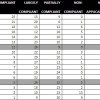Iceland’s Prime Minister Sigmundur Gunnlaugsson resigned on Tuesday just one day after thousands of people marched in the streets protesting his use of secret bank accounts facilitated by Mossack Fonseca, a Panamanian law firm which had as clients Gunnlaugsson and his wife. Iceland was the only country that jailed top financial executives behind bars in […]

Public pressure forces Iceland’s prime minister to step down over Panama Papers

Practicing open data: publishing court decisions in Germany
In order to hold government to account, people need to know what it is doing. That is why it is so important for civil society to be able to have access to information on all types of government actions. Advocating for what we call “open data” is at the heart of the anti-corruption movement. In […]

G20 anti-corruption meeting: progress, but without ambition
The G20 is making progress in the fight against corruption. However for all the talk, the representatives of the world’s leading economies are not setting the bar high enough. From our point of view, unless the G20 mandates and enforces greater corporate transparency, corrupt public officials, gangsters, drug dealers and terrorists will continue to misuse […]

OECD moves forward on tax transparency
Last September G20 leaders moved towards greater transparency to crack down on tax evasion. They promised a “new global standard” to increase the exchange of financial information between countries. Whereas today tax authorities have to chase information from others authorities if and when they suspect foul play, this new standard will require any jurisdiction signing […]

Rediscovering the power of trust: the case of education in Tunisia
“I know I have a problem. It is all over the newspapers, everybody talks about it, but what can I do? I have no evidence. Can you bring me some evidence, please? Even better, just let me know what I shall do.” – A minister of education during an OECD integrity assessment about efforts to fight […]

Three reasons Australia should regret dropping corruption from B20 agenda
The Australian government took the reins of the G20 on 1 December. In its vision it acknowledges that corruption is bad for business, but Australian business doesn’t seem to think the same, having dropped it from its top priorities for 2014. We think this is a mistake. “Corruption is a severe impediment to sustainable economic […]

Cyprus: a chance to strengthen its fight against money laundering
The issue of whether or not to bail out the troubled banking sector in Cyprus has taken on serious political overtones as the crisis deepens. During the past few weeks Cyprus has been accused of failing to combat money laundering and fraud and that Russian oligarchs seek refuge for their money in this “tax haven” […]

Anti-money laundering: In pursuit of the hidden owners
This text was crossposted from Transparency Internarional EU’s blog. The author is Neil Clark. On 10 January, advocates from the Transparency International EU Office attended a presentation unveiling the results of Project BOWNET. Carried out with financial support from the Prevention of and Fight against Crime Programme of the European Union, the project aimed at understanding the feasibility of developing an intelligent system able […]

Prosecuting transnational corruption: France in the dock
The OECD has accused France of not responding effectively to the problem of international corruption. The third monitoring report on France’s implementation of the OECD Anti-Bribery Convention did cite some progress: efforts have been taken to make businesses aware of the need to fight corruption and implement corruption prevention measures. But the rest of the […]

Codes of conduct: a tool to clean up government?
The following post is one in a series of blogs that will focus on codes of conduct over the coming weeks. The posts will look at the key features of a code of conduct, their different applications in different country contexts, the public officials that they cover, and their overall effectiveness. Most importantly, they will […]
- State Capture in South Africa 14 February 2017
-
 What’s next for Ukraine?
16 December 2016
What’s next for Ukraine?
16 December 2016
-
 Cleaning up sport: conflicts of interest at the top
9 December 2016
Cleaning up sport: conflicts of interest at the top
9 December 2016
-
 OGP: France must do more to tackle corruption
9 December 2016
OGP: France must do more to tackle corruption
9 December 2016
-
 Pharma companies in Slovakia: Uncovering conflicts of interest
9 December 2016
Pharma companies in Slovakia: Uncovering conflicts of interest
9 December 2016
-
Nokubonga Ndima: Young people can make a change for a better future...
-
Benjamin M: Very good article! Congrats!...
-
arun kottur: In India sports minister was involved decades are ...
-
Ekonomi: Very beneficial article. Thank you very much. htt...
-
ksweeney1: I do not agree that https://apex.aero/2016/09/22/g...
Search
Categories
Latest news from Transparency International
No items, feed is empty.

 Connect with us on Facebook
Connect with us on Facebook Follow us on Twitter
Follow us on Twitter